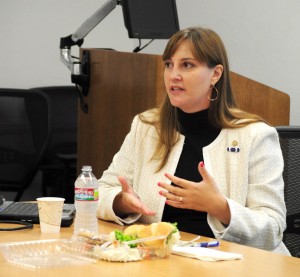Advocate reflects on global work
Cynthia L. Hogle, an advocate for women in Afghanistan, discussed her work at a seminar Wednesday hosted by the USC Center on Public Diplomacy. Hogle undertook projects to improve the lives of Afghan women in Maiwand, a village in the Taliban’s home province of Kandahar.

Overseas · Cynthia L. Hogle, an adviser to the Afghanistan World Foundation, explains her work encouraging Afghan women to speak their minds in a male-dominated society. – Priyanka Patel | Daily Trojan
According to Hogle, the rural village is incredibly poor and women have a literacy rate of only 7 percent.
Hogle is an international advisor to the Afghanistan World Foundation and a member of the American Support for Afghanistan Board. She also worked in Iraq as a public diplomacy officer for the U.S. Department of State and spent nine months in Afghanistan as a human terrain analyst with the United States Army.
Hogle spent months acquainting herself with women living in the village and gaining their trust, hoping that she could convince them to organize themselves to work together to progress toward a more gender-equal society.
Hogle said she held meetings for the women to gather and discuss what changes they wanted.
In some instances, the women would not leave their homes. Still, Hogle’s first meeting drew an unexpectedly large crowd of 94 women.
During this meeting, Hogle said the women called for the construction of a school for girls, the installation of a water pump and the chance to learn vocational skills. Hogle said she was shocked at the women’s eagerness to ask for such changes in a traditionally male-dominated Afghan village.
“They asked the district governor for things they wanted, and I think it’s pretty amazing that they asked for that straight up,” Hogle said. “These women have been looking for an opportunity, and as soon as they got it they went for it. If you give them a little bit of information and start responding to what they’re asking for, they’ll go for it.”
Meredith Deane, a graduate student studying public diplomacy, said that she was surprised husbands allowed their wives to attend meetings that called for such revolutionary change.
“The women wouldn’t even be there in those meetings if it wasn’t for the men allowing them to,” Deane said. “The fact that there are men out there [in Afghanistan] who aren’t all anti-feminist was pretty amazing to me.”
One of Hogle’s main accomplishments was the construction of a women’s center in Maiwand, which was prompted by the women’s desire for a place for their daughters to learn.
Hogle’s achievements, however, were no easy feat. According to Hogle, some male soldiers did not believe her claim that the women wanted a school to be built.
Additionally, Hogle claimed that the lack of cooperation between everyone working at her military base was a huge problem that has yet to be fixed.
“I pushed the envelope many times, I was the woman who would not back down. [The school] happened against all odds,” Hogle said. “In the end you have to fight for it, and that’s what these women had to do. I used to tell the women, ‘You think you have problems talking to men — but they don’t like to listen to me either.’”
Hogle’s discussion of her projects motivated some students to work for similar improvements around the world.
Tiantian Xiang, a graduate student studying strategic public relations, said that women in other countries are just as desperate for such an opportunity.
“I want to go into PR for non-profit organizations,” Xiang said. “I’m from China and I know that there are some rural places in China where women stay at home and don’t really talk to women a lot. So maybe something like this can be done in China too.”
